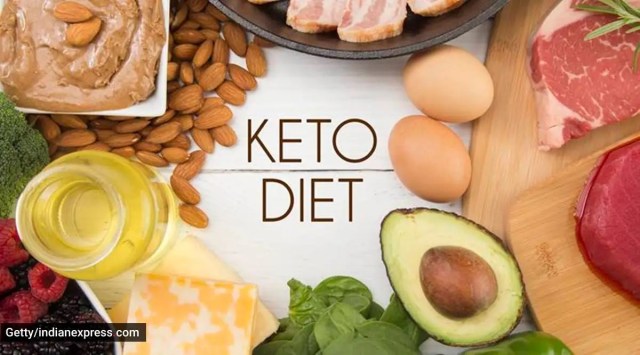- India
- International
Keto or low-carb, high-fat diets can increase your risk of heart disease, says new study
A new study, conducted over 11.8 years, shows a link between keto-like diets and heart disease. Given their existing cardiac triggers, Indians should not go for extreme diets but choose a sustainable option, say diabetologists Dr Anoop Misra and Dr V Mohan
 Taking low carbohydrates means depriving the body of one key macro-nutrient (Source: Getty Images/Thinkstock)
Taking low carbohydrates means depriving the body of one key macro-nutrient (Source: Getty Images/Thinkstock) Is the popular ketogenic or “keto” diet, which involves consuming a low amount of carbohydrate and a high amount of fat, damaging your heart? A new study at the American College of Cardiology’s annual scientific session, together with the World Congress of Cardiology, suggests that a “keto-like” diet may be associated with higher blood levels of “bad” cholesterol and a two-fold heightened risk of cardiovascular events such as chest pain (angina), blocked arteries requiring stenting, heart attacks and strokes.
“Our study found that regular consumption of a self-reported diet low in carbohydrates and high in fat was associated with increased levels of LDL cholesterol and a higher risk of heart disease. To our knowledge, our study is one of the first to examine the association between this type of dietary pattern and cardiovascular outcomes,” said Iulia Iatan, MD, PhD, attending physician-scientist at the Healthy Heart Programme Prevention Clinic, St Paul’s Hospital and University of British Columbia’s Centre for Heart Lung Innovation in Vancouver, Canada, and lead author of the study.
For this study, Dr Iatan and her colleagues defined a low carbohydrate high fat (LCHF) diet as consisting of no more than 25 per cent of total daily energy or calories from carbohydrates and more than 45 per cent of total daily calories from fat. They dubbed this an LCHF diet and “keto-like” because it is a bit higher in carbohydrates and lower in fat than a strict ketogenic diet. The research team analysed data from the UK Biobank, a large database with health information from over half a million people living in the UK who were followed for over 10 years.
“This study is going to be a game-changer because this is one of the longest ones on diet so far. And the UK Biobank has a good repository of samples. So, the results indicate that the harm outweighs the good of the keto kind of diet. Compared with participants on a standard diet, those on an LCHF diet had significantly higher levels of both LDL cholesterol and apolipoprotein B (apoB), the protein component that the study says sits on LDL and other atherogenic lipoprotein particles. According to Dr Iatan, previous studies have shown that elevated apoB may be a better predictor than elevated LDL cholesterol for risk of cardiovascular disease. After an average of 11.8 years of follow-up — and factoring in other risk factors for heart disease such as diabetes, high blood pressure, obesity and smoking — people on an LCHF diet had more than two-times higher risk of having several major cardiovascular events, such as blockages in the arteries that needed to be opened with stenting procedures, heart attack, stroke and peripheral arterial disease. And significantly. 9.8 per cent of participants on an LCHF diet experienced a new cardiac event, compared to 4.3 per cent of those on a standard diet,” says Dr Anoop Misra, Chairman, Fortis CDOC Hospital for Diabetes and Allied Sciences, New Delhi.
WHAT’S THE LOGIC?
“The logic is fairly simple. Carbohydrates are the body’s first reserve of energy. Taking low carbohydrates means depriving the body of one key macro-nutrient. The body then looks for other sources to fuel itself up and starts breaking down fat for energy. The breakdown of fat in the liver produces ketones, chemicals that the body uses as energy in the absence of carbohydrates. But the fats consumed by Indians are mostly saturated fats, including lard, coconut oil, cheese, ghee and mayonnaise. Even if 30 to 35 per cent is fat intake, then around 15 to 20 per cent of it is saturated fat and not poly or monounsaturated fats. This accelerates fat deposition and even plaque ruptures. This study, combined with the recent findings that the artificial sweetener called Erythritol, mostly used in keto food products, clots blood and poses a heart risk, indeed makes us reconsider the value of a keto diet. Link these with the spate of heart attacks in young people and it is worth considering if fad diets have anything to do with these cases,” adds Dr Misra.

Dr V Mohan, Chairman, Dr Mohan’s Diabetes Specialities Centre, Chennai, isn’t surprised by this study and says he has had anecdotal evidence of the findings among his patients on a keto diet. “I have been talking about the damaging effects of the keto diet or any LCHF diet for a long time. It just doesn’t work given our eating habits. The Indian diet contains only about 8 to 10 per cent protein and for long we have been highlighting that we should try to increase protein consumption to 20 per cent, which will help us control diabetes. Even if we manage to do that, then 80 per cent of your calories would have to come from carbs and fats. Proponents of a ketogenic diet generally suggest limiting carbohydrates to 10 per cent of total daily calories, protein between 20 to 30 per cent and obtaining 60 to 80 per cent of daily calories from fat. In a keto diet, carbs would amount to a banana a day. Which means no rice or wheat, no Bengal grams, yam or potato. So, 70 per cent of your calories would come from fat, which means overloading of butter, ghee, and a lot of saturated fats. With so much fat, naturally LDL levels will go up. Besides, these diets can lead to deficiencies of micronutrients, fibres and antioxidants, all of which help in management of heart health and diabetes,” he explains.
Dr Mohan argues that while a keto diet may yield short-term benefits, leading to a sugar crash (you may even go off diabetic drugs for a while) and weight loss, the long-term cost on cardiac health is heavy as blood fats will increase. “The cholesterol and LDL levels go up within six months to a year of following a keto diet. So, imagine how over a period of time, there will be an increase in coronary plaque and calcification. The risk of stroke and heart attack will naturally go up,” he adds.
DIET HAS TO BE SUSTAINABLE
In India, sustainability of a diet is a huge problem as even a normal platter is carbohydrate-heavy, leading to weight gain, low-grade inflammation and increase in triglyceride levels. “So have a balance of everything. I would say reduce carbs from the current 60 per cent to 50 per cent. Also take good carbs like wholegrain, brown rice, multigrain bread, whole wheat, oats with bran and unpolished millets. Up your protein to 20 per cent. The remaining 30 per cent of your calories can come from monounsaturated fats, fish and nuts like almonds and walnuts. Monounsaturated oils are groundnut, gingelly and mustard oil. The worst oils are coconut and palm which are high in saturated fats. These simple tweaks are doable and can even slow down progression of diabetes. No extreme diet can be good,” Dr Mohan says. Given these findings, he advises that while on the diet, users must have their cholesterol levels monitored and should try to address other risk factors for heart disease or stroke, such as diabetes, high blood pressure, physical inactivity and smoking.
WHY IS A DEEPER STUDY NEEDED?
Because the study was observational, it has revealed an association between the diet and an increased risk of major cardiac events. A causal relationship has yet to be investigated further and established. Even Dr Iatan said the findings merit further research in prospectively designed studies, considering approximately one in five Americans report being on a low-carb, keto-like or full keto diet.
Apr 27: Latest News
- 01
- 02
- 03
- 04
- 05








































